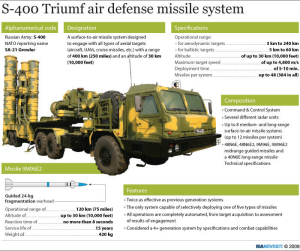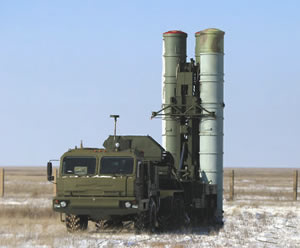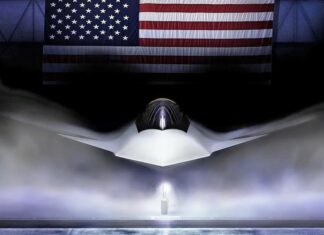Almaz Antey has recently received a multi-year order for the S-400 Triumf surface-air missiles (SAM), equipping the Russian defense forces with several regiments of the advanced SAMs. For the near term the company is likely to be focusing on domestic deliveries. However, despite the Russian Defense Ministry claim that there are no plans so far to export the S-400 Triumph, Russia is already pitching its top-of-the-line air defense system for export. At DefExpo 2012 in India this week, Almaz Antey officials were promoting the Triumph air and missile defense system.

Defense Update spoke with Sushin Yury, Chief of Department at Almaz Antey the corporation that designed and built the missile, about the possibility of Russia selling the S-400 Triumph to India. In the words of Mr. Sushin, “if India shows interest in the purchase of the S-400, Russia can definitely provide India with all the information it needs about the system.” While Russia has offered the system to several countries, to date the S-400 has not been exported by Russia to any other country.
Triumf is widely regarded as one of the most advanced SAM systems in the world and one considered an important element in the Russian air defense for the next generations. It was further revealed to Defense-Update that the S-500 is not an upgrade of the S-400 and both these systems will have pivotal albeit different roles in Air-Defense. The S-400 causes much concern among western air forces, as none of the existing 4++ generation fighter aircraft, nor the F-35 JSF, are designed to penetrate areas defended by the Triumf. The system can simultaneously engage 36 targets, controlling up to 72 ready to fire missiles of four different types, providing an integrated multi-layered air defense system.
Typical unstealthy, or partially stealthy combat aircraft will have more difficulty surviving within the coverage of the S-400 systems. Its high transmit power, large radar and missile seeker apertures, low side lobes, generous use of monopulse angle tracking and extensive ECCM features make these systems difficult to jam effectively. Self protection jammers commonly used against other surface-to-air missiles will need to produce relatively high X-band power output, and exploit monopulse angle tracking deception techniques, where Digital RF Memory (DRFM) techniques with high signal fidelity are nearly essential. Even so the challenges in defeating these systems with a self protection jammer are not trivial – raw power-aperture does matter in this game.

















